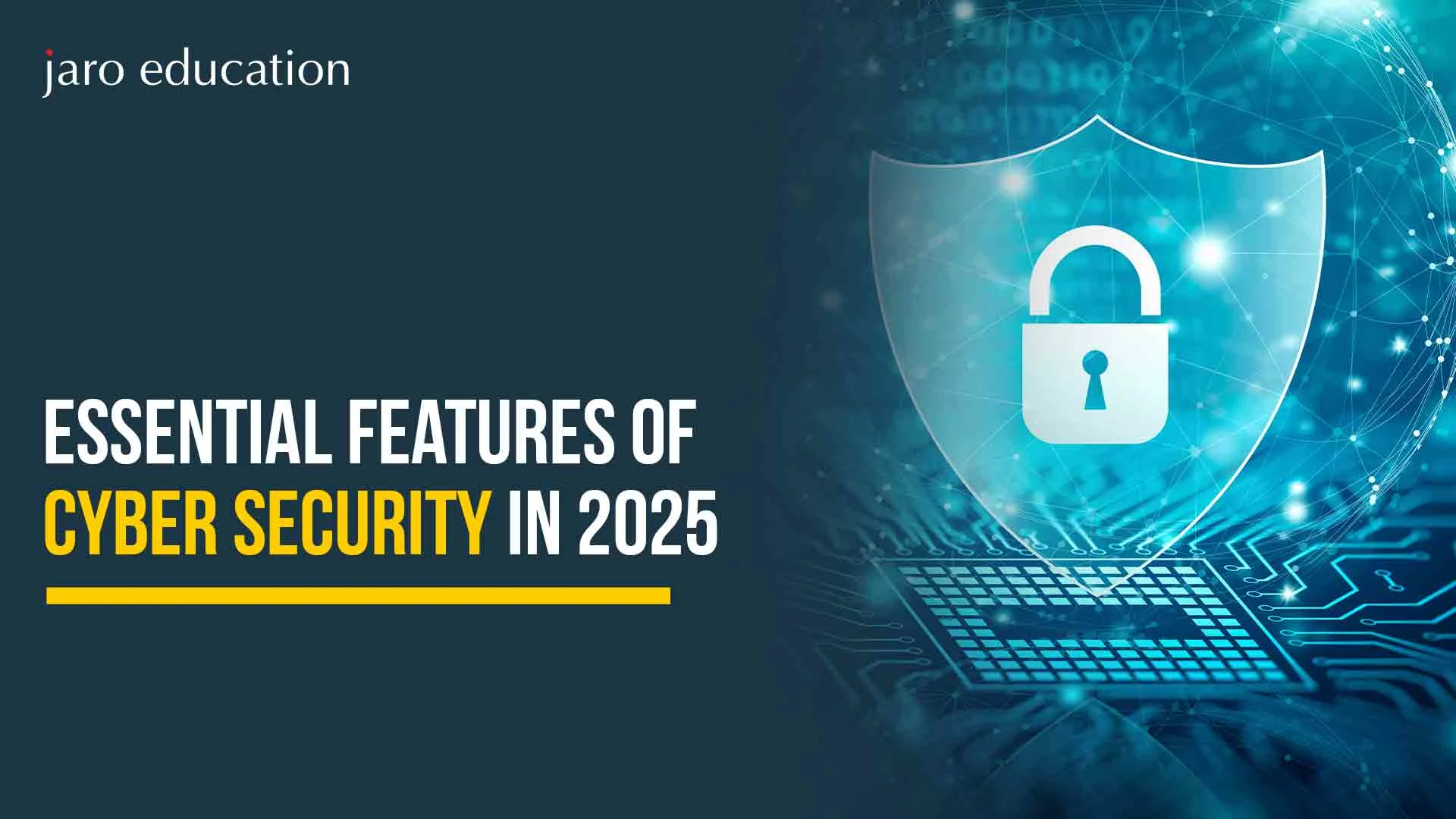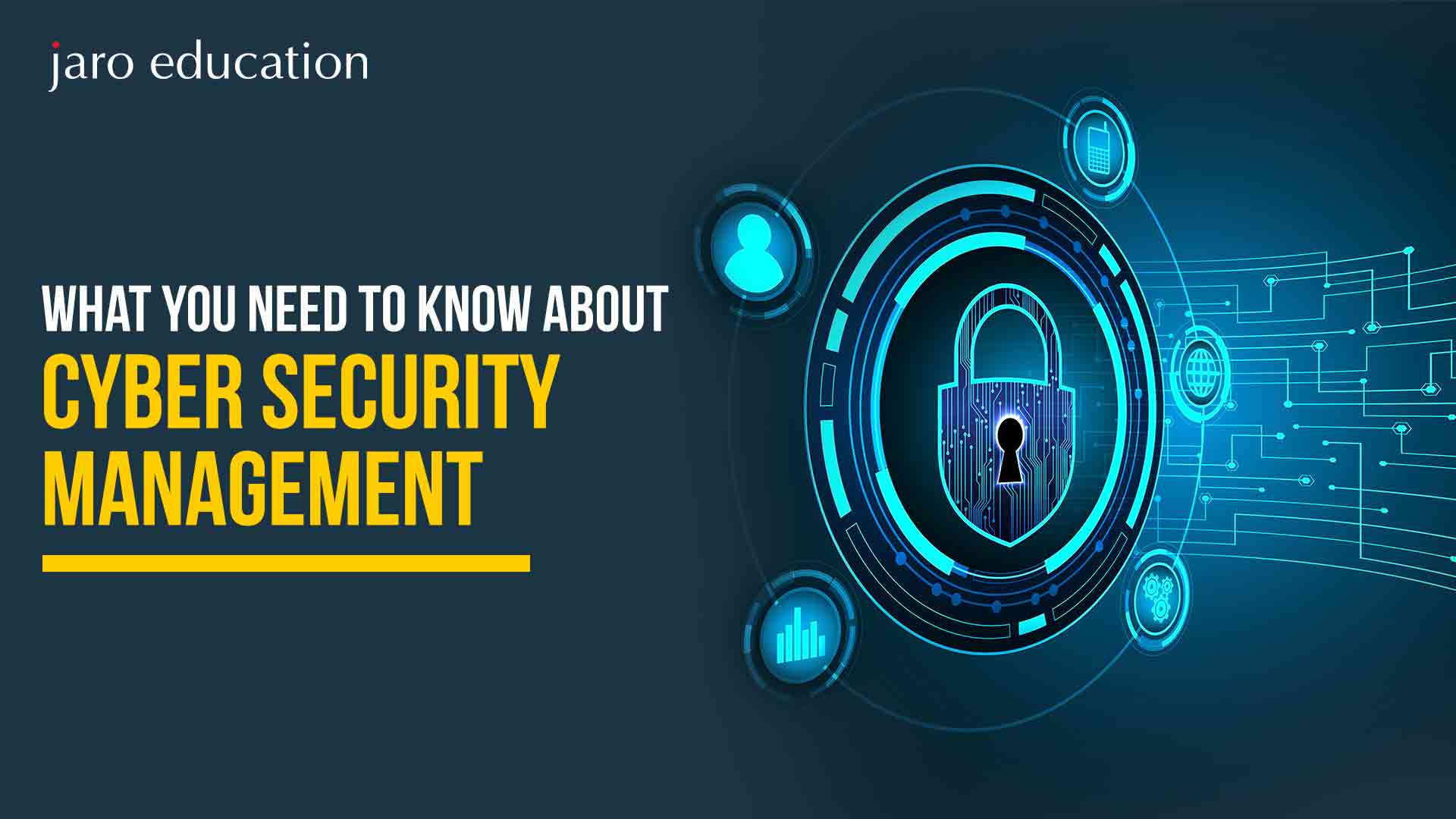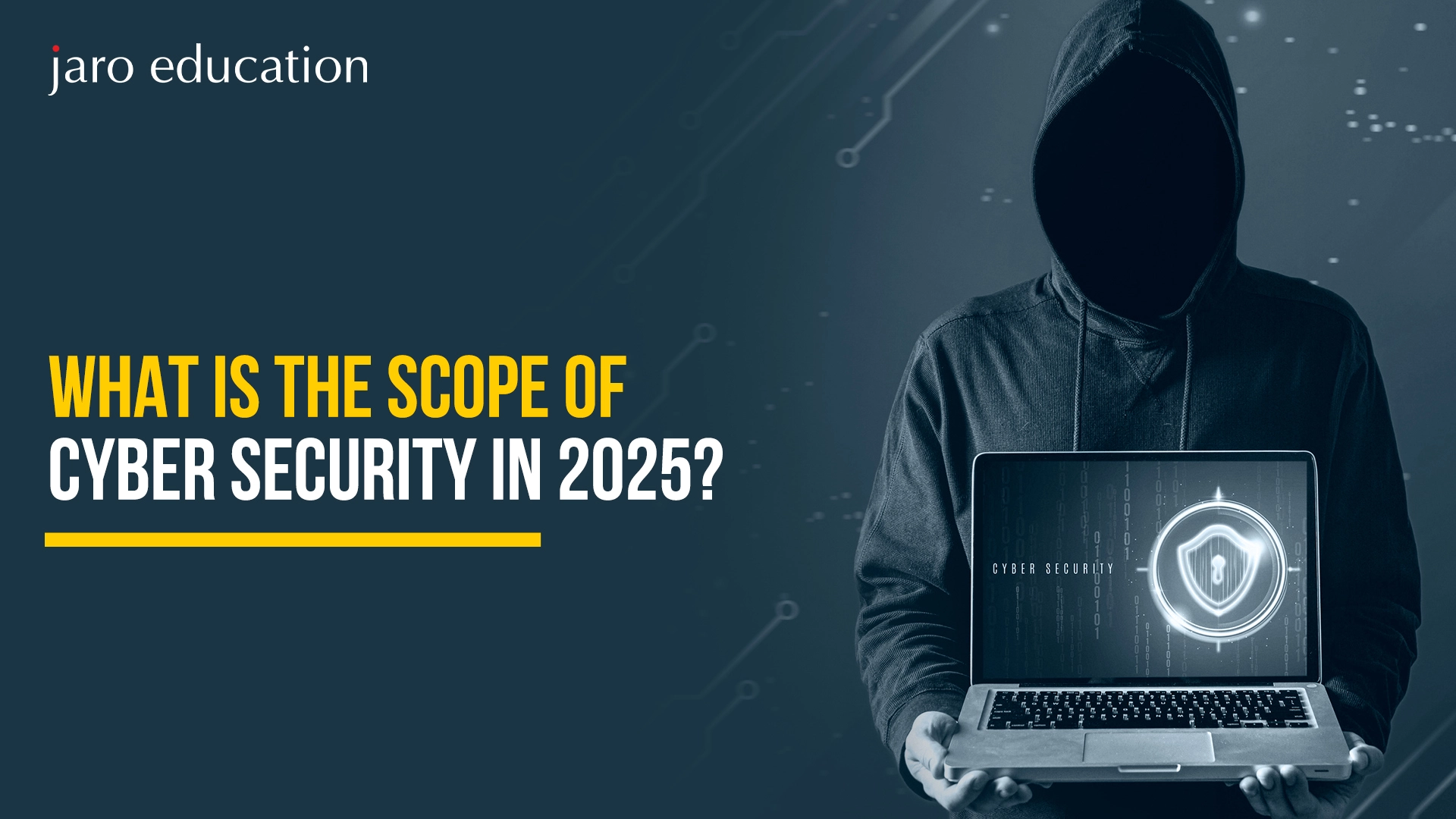Why Choose Cybersecurity as a Career? Everything You Need to Know
Table of Contents

- jaro Education
- 21, December 2024
- 6:00 pm
A career in cybersecurity provides space for growth and development for both the professional and the organization. According to reports, there was a 14% increase in cybersecurity jobs compared to last year. This means a booming industry with great potential for computer science students to take up cybersecurity as a career.
In this blog, we will explore what cybersecurity means and what a career in cybersecurity would entail. Further, we will focus on 5 steps to work towards a career in cybersecurity. Read on to unlock the secrets of the cybersecurity space and how you can plan a path forward in the coming years.
Let’s dive right in!
How to Start a Cyber Security Career in 2025?
Quick Tip
Important steps to start a career in cybersecurity:
- Bachelor’s Degree in Computer Science or a similar field.
- Knowledge of firewalls and various forms of endpoint security.
- Knowledge of languages/tools such as C++, Java, Node, Python, Ruby, Go, or PowerShell is an added advantage.
- The ability to often work under pressure and in a fast-paced environment.
- Possesses the right eye for detail and outstanding problem-solving skills.
- Up-to-date knowledge of the latest cybersecurity trends and hacker tactics.
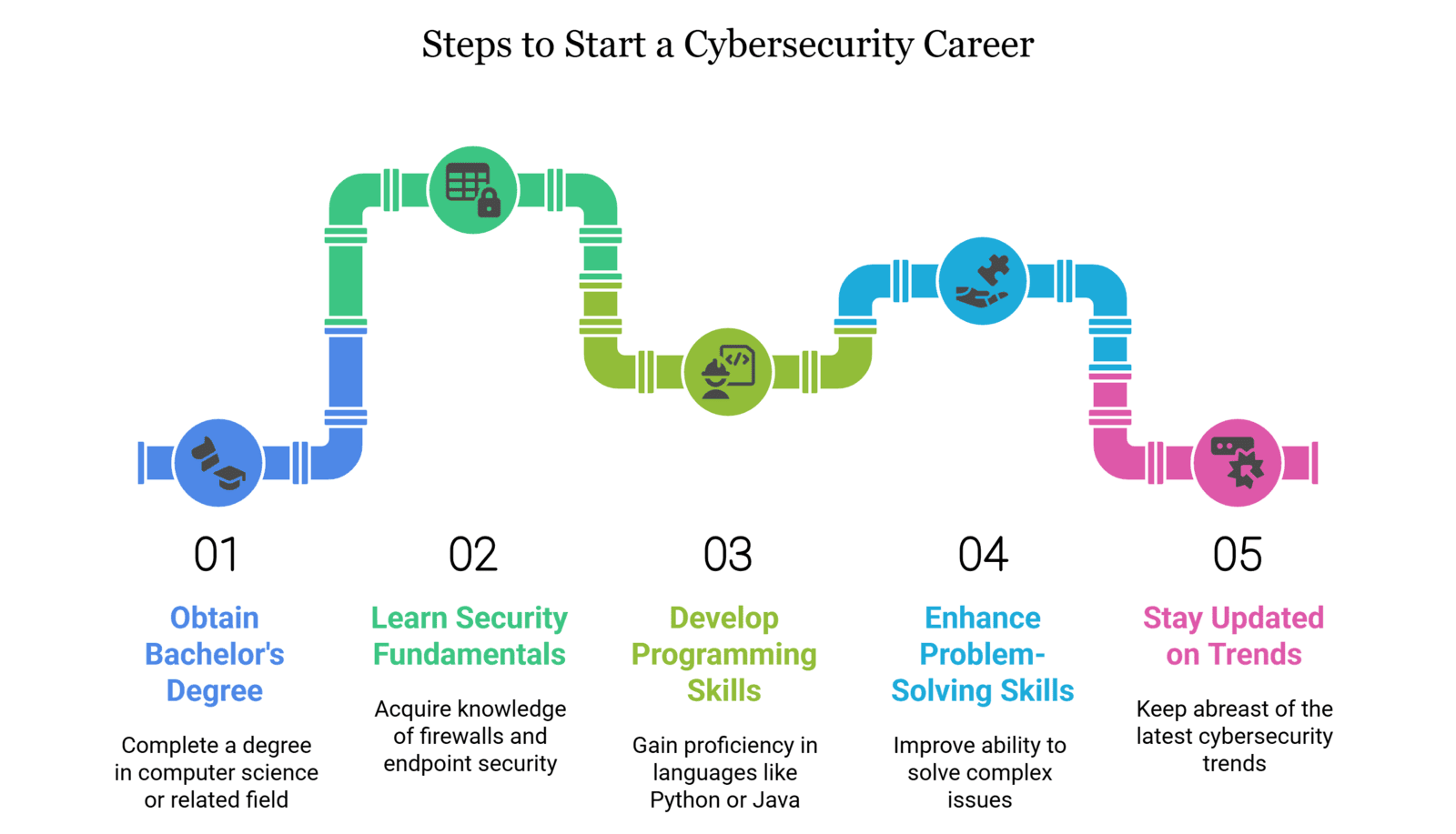
What is Cybersecurity?
In essence, cybersecurity is an umbrella term for the technologies and processes that are set to protect networks, systems, and data from cyber threats. A career in cybersecurity usually involves dealing with threats such as hacking, malware, and unauthorized usage of systems.
Cybersecurity uses multi-layered protective systems to keep data threats at bay. This involves measures such as Firewalls, Antivirus software, and Encryption methods. This way, if one system fails, the others can hold up the network’s protection and keep threats at bay. A cybersecurity specialist has an in-depth understanding of all these systems and how to work them perfectly.
5 Powerful Steps to Curve Your Career in Cybersecurity
Choosing cybersecurity as a career involves dealing with a dynamic field filled with opportunities for specialisation. The competition is immense, so it is difficult to stand out from the crowd. A combination of these 5 powerful steps can go a long way in establishing career paths in cybersecurity. Here is a detailed deep dive into the world of cybersecurity and what you can do to be a part of it:
1. Step 1: Formal Education Pathways
The degree that equips you with theoretical knowledge and a broader understanding of the field is essential. So, Bachelor’s programs in computer science, IT, or cybersecurity provide an in-depth introduction to topics like ethical hacking and network security, preparing you for entry-level roles in the space.
Master’s programs in computer science further deepen your understanding of these concepts, with opportunities for specialization in cybersecurity. A master’s in computer applications with a cybersecurity or IT specialisation can provide insight into areas like threat analysis and security architecture.
For example, your career path in cybersecurity could start with a Bachelor of Computer Applications. Then, you might do a master’s program in computer applications and specialise in cybersecurity. This could lead to a career in ethical hacking.
2. Step 2: Continuous Learning
Career paths in cybersecurity are continuously developing and evolving with the growth of technology. Staying updated in the field is critical for a solid career in cybersecurity. Your adaptability is key in this industry.
Workshops and seminars: Hands-on workshops and seminars, both online and offline, give you the chance to engage with incident response and malware analysis. Industry experts prepare incident simulations for you to train and improve your skills.
Conferences: These events bring together people from all industries and levels, opening your perspective on global careers in cybersecurity.
Coding Bootcamps: Short-term boot camps offer practical skills like teamwork, communication, and leadership while also preparing you for intense security situations.
Online Resources: Text, audio, and video platforms have a lot of free resources you can access. From news articles to free courses, you have the option to expand your knowledge and build cybersecurity as a career.
This leads to technological exposure and an opportunity to build skills and networks with industry experts.
3. Step 3: Certification Courses
Certification courses, both short- and long-term, provide a rigorous curriculum condensed into a week-long or month-long program. They are extremely important for a career in cybersecurity because certifications add credibility to newer and more niche skills in the industry. Moreover, you can also study while you work, cross-applying the skills you learn in both places. The benefits of getting certified by the country’s top tech schools are immense. The job market opens for more senior roles, and these courses prepare you for the real world.
Jaro Education, in association with its top-tier institutions and universities, IITs, IIMs, and global universities, brings you exclusive courses on cybersecurity as a career path. Choose and gain access to education experts who can guide you through the application process and beyond.
4. Step 4: Hands-On Experience
Practical experience is invaluable when you choose a career in cybersecurity. Studying the right courses opens doors for internships, apprenticeships, and real-world projects you can be a part of. Here, you can apply theory to practice and learn qualitative attributes like problem-solving and critical thinking along the way.
How?
Internships: Research and choose companies that you could add value to, but also learn a lot from. Both the private and public sectors offer cybersecurity roles. Through the university’s career guidance portal, secure an internship with growth potential.
Personal projects: Build your tools and set up your processes and systems to practise test security concepts you learn in a classroom.
Competitions: Inter-college competitions, individual competitions, and others can help you practise hacking skills too.
This shows your passion for a career in cybersecurity with a portfolio of proven skills. It also builds your confidence as a professional in the field, leading to full-time opportunities.
5. Step 5: Specializations
Building a niche expertise within the industry can help you with a career in cybersecurity. This gives you a way to create unique value for an organization and stay relevant in the long run. Some popular areas you could specialize in include: Penetration testing, Cloud security, IoT security, Threat intelligence, and Digital forensics. Investigating any of these areas and leveling up your expertise with any combination of learning tools can get you specialist status. This is very relevant for any cybersecurity career path. You could be a leader in your specific field, while your skills would be in high demand.
That is why planning out the right combination that works for you is essential for a career in cybersecurity. Jaro Education’s 1:1 mentorship can give you insight into what path works best for you, depending on your needs and aspirations.
Is Cyber Security for Me?
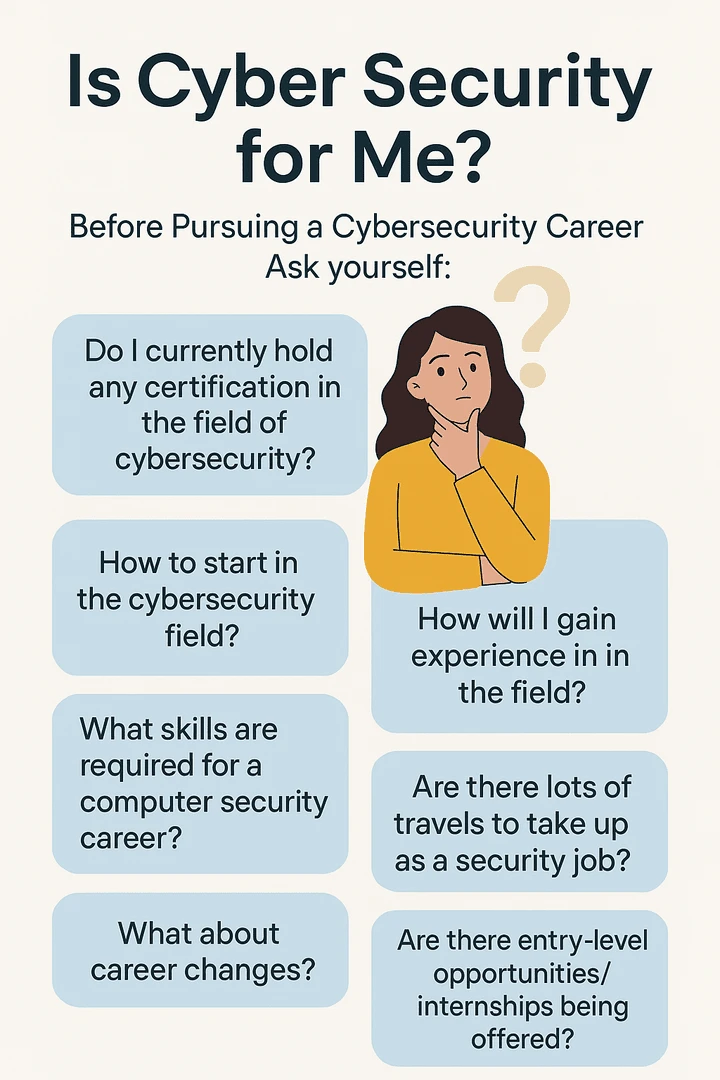
Before Pursuing a Cybersecurity career, ask Yourself:
- Do I currently hold any certifications in the field of cybersecurity?
- How to start in the cybersecurity field?
- What skills are required for a computer security career?
- How will I gain experience in the field?
- Are there lots of travel jobs to take up as a security job?
- Are there entry-level opportunities/internships being offered?
- What about career changes?
Most of the questions above will be answered in this, which will include getting started with cybersecurity skills and job outlooks — the other things, of course, would be dependent on your goals and the demand needs of employers in your region.
What is the Purpose of Cybersecurity?
- Confidentiality: Cybersecurity as a career path ensures the protection of sensitive information, such as customer information, passwords, banking data, etc., and keeps it accessible only to authorized users.
- Integrity: A career in cybersecurity means that you would ensure no data gets altered or corrupted.
- Authentication: Career paths in cybersecurity involve verifying user identities to prevent unauthorized access to sensitive information.
- Encryption: Data needs to be transmitted and stored sensitively. With the encryption process, a cybersecurity specialist strengthens protection around it.
- Security: A career in cybersecurity protects networks, devices, and software from viruses or intrusions. Moreover, if a cyberattack does occur, a specialist is expected to jump quickly into action and reduce the damage.
A Skill Roadmap: What Aspiring Cybersecurity Specialists Need
A career in cybersecurity requires three types of skills. Well-rounded professionals have a higher chance of being hired and promoted in an organization.
Skill Type | Definition |
Technical | Proficiency in programming languages, network protocols, and security tools like firewalls and authentication. |
Analytical | If you choose cybersecurity as a career, you also need qualitative and analytical skills such as problem-solving, adaptability, efficiency, and a solution-oriented mindset. |
Compliance | Laws and standards exist to keep data safe and regulated. A deep knowledge of laws like the General Data Protection Regulation and ISO standards is key. |
Careers in Cybersecurity: Jobs and Salary to Watch Out For
Choosing cybersecurity as a career path opens jobs dealing with sensitive data, networks, and systems across various industries. Since every industry uses data, cybersecurity specialists can branch into areas like retail, e-commerce, research, healthcare, and more.
Careers in Cybersecurity | Job Role | Average Annual Salary (INR) |
Cybersecurity Analyst | Monitors networks and ensures protection against security breaches. In the event of a security breach, they investigate incidents and implement defence strategies to protect data | ₹5–₹8 LPA |
Ethical Hacker | Penetration testing is a career in cybersecurity where professionals simulate cyberattacks to identify weaknesses in the firewall and recommend solutions. | ₹6–₹10 LPA |
Security Architect | An architect in the cybersecurity space focuses on designing and implementing robust security systems | ₹15–₹30 LPA |
Network Security Engineer | Focuses on protecting networks, firewalls, and communication systems. | ₹6–₹12 LPA |
Incident Responder | This career in cybersecurity focuses on being the first line of defence in the event of a breach. Their role is to minimise the impact of the threat. | ₹5–₹10 LPA |
Compliance Analyst | This career in cybersecurity keenly focuses on organisational compliance to cybersecurity regulations and standards set by the government and the market. | ₹4–₹8 LPA |
Source: Glassdoor
Careers in cybersecurity also include managerial positions that oversee other cybersecurity professionals and work on big-picture strategy. All these jobs focus on one direct result, which is keeping organizational data and sensitive information safe from threats.
Your Career, Our Guidance: Expert Counselling by Jaro Education
At Jaro Education, we believe that the right mentorship can unlock transformative upskilling opportunities and set new benchmarks in one’s career. Our career-oriented programs are thoughtfully designed to help students and professionals discover their true potential—aligning personal strengths with evolving industry demands and guiding them toward the most effective learning paths.
For those aspiring to build a future in the rapidly evolving world of technology, Jaro offers a cutting-edge curriculum in cybersecurity, developed by leading industry experts. The program emphasizes practical learning through hands-on experiences and real-world case studies, empowering learners to combat digital threats and thrive in one of today’s most high-impact domains.
Partner with Jaro Education to make future-ready career decisions—backed by knowledge, mentorship, and industry relevance.
Final Thoughts
With these 5 powerful paths, you can improve your chances of breaking through the tough job market and pursuing cybersecurity as a career. Utilize all available resources and fine-tune your skills. Your commitment to learning and continuous improvement can go a long way in carving a niche career in cybersecurity.
Frequently Asked Questions
Cybersecurity refers to the practice of protecting systems, networks, and programs from digital attacks. It involves measures to defend against cyber threats like hacking, data breaches, malware, and phishing.
Yes, cybersecurity is a highly promising career in 2025 and beyond. With increasing digital dependence and rising cyber threats, there is a growing demand for skilled cybersecurity professionals across industries.
You typically need a background in computer science, IT, or engineering. However, many cybersecurity courses, including those by Jaro Education, offer training for beginners and professionals with different educational backgrounds.
Some popular cybersecurity job roles include:
- Cybersecurity Analyst
- Ethical Hacker (Penetration Tester)
- Security Consultant
- Network Security Engineer
- Information Security Manager
- SOC Analyst
Salaries vary based on experience and role. Entry-level professionals in India can earn ₹4–6 LPA, while experienced cybersecurity experts can make ₹15 LPA or more. Globally, salaries are significantly higher.





